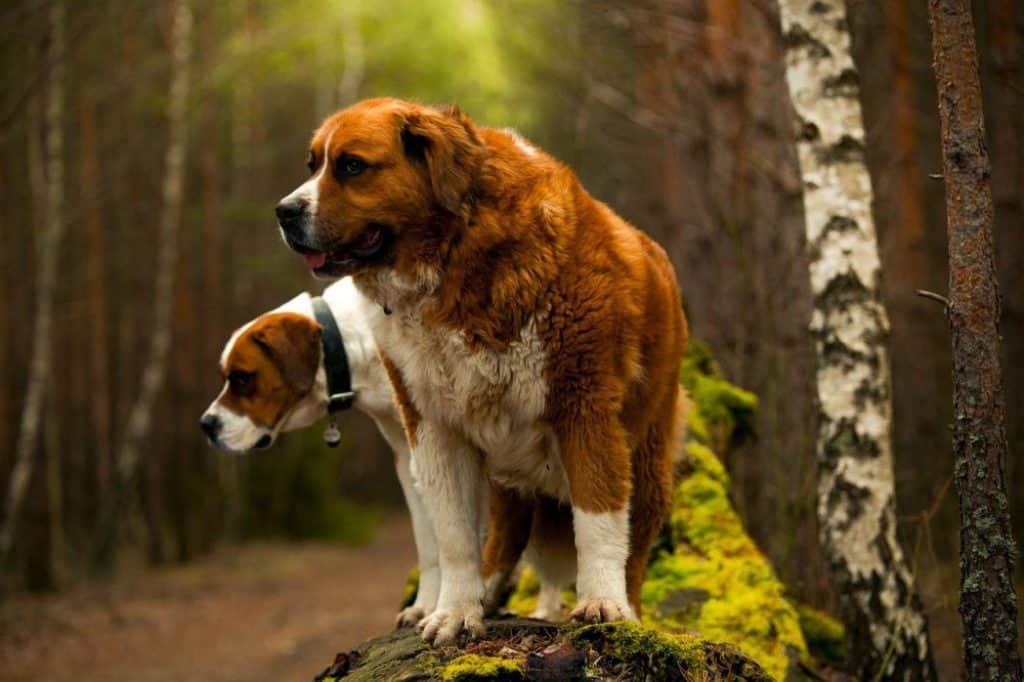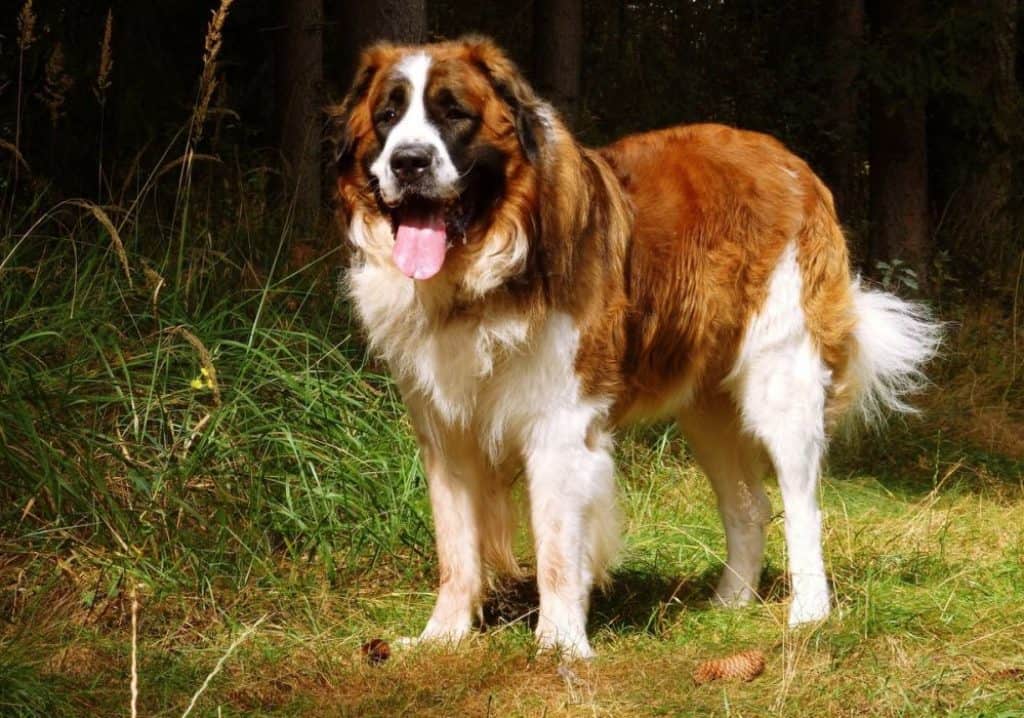Saint Bernards are widely known for being loyal, friendly, and loving family dogs.
Their reputation as kind and gentle giants is only further solidified by the stories of their heroic past and frequent appearances on TV and in movies.
They are affectionate towards their owners, great with kids, and even friendly to strangers.
However, they are extremely large dogs and also one of the strongest breeds in the world.
You can hardly find another breed that can overpower these furry behemoths.
For potential owners who already have another dog in the family, this may be a reason for concern, leading them to wonder are Saint Bernards good with other dogs.
With dogs this big, potential tension and hostility among the animals in the household could prove to be unbearable.
Below, you’ll learn how St. Bernards do with other canines and what you can do to make them get along better.
[wpsm_toplist]
Are Saint Bernards Good With Other Dogs?

In general, Saint Bernards get along pretty well with other dogs.
They even tend to do well with other, much smaller, pets, such as cats. St. Bernards are usually not aggressive, nor territorial.
In fact, they’re a very social breed and, in most cases, they will enjoy interactions with other dogs.
Their good relationship with other dogs is in part due to their mellow and kind nature.
In addition, they are perfectly aware of their size and imposing presence and don’t need to push other animals around to prove their strength and supremacy.
However, their best behavior comes to the surface only when they’re socialized properly and on time.
Having your Saint Bernard spend time with other dogs as a puppy and raising them with other animals will ensure that they get along well when they’re fully grown.
The last thing you want is a poorly socialized 180-pound giant.
Are St. Bernards Aggressive?

As a breed, Saint Bernards are not known as very aggressive dogs. In fact, most of the time, the opposite is true; they’re tolerant, calm, and well-behaved.
Still, like with all other breeds, certain situations and contexts can cause them to behave more aggressively.
In rare cases, some St. Bernards simply inherit bad temperament genes creating more high-strung, suspicious, and even aggressive personalities.
Also, they are very protective of their owners.
While they will usually protect them by standing their ground, if they sense that there’s a real threat, they may react and attack.
This is why the training is important.
If a dog of this size misinterprets these kinds of situations, the consequences can be dire.
Plus, failure to socialize a St. Bernard can sometimes lead to aggression as they look to prove their alpha male status.
This is particularly the case with male dogs.
How To Train A Saint Bernard To Get Along With Other Dogs?

The usual kind nature of St. Bernards doesn’t mean getting along with other dogs is a given.
You’ll still have to put in some work to raise the dog in a manner that will make it harmless to other animals.
This is especially important with giant breeds such as Saint Bernards, as they can physically dominate almost any other dog.
Furthermore, having dogs this big who don’t get along will make life much harder for everyone in the household, not to mention the mess they can create.
As always, the dog’s behavior in many ways depends on the owner and the way they treat and train their pooches.
Here are a few tips that can help you make your St. Bernard even more sociable and friendly towards other dogs.
As I’ve mentioned a couple of times before, early socialization is a key to a well-behaved dog.
It’s never too early to start exposing your St. Bernard to other dogs and strange people.
By having a chance to hang out with other members of their species, puppies will learn what is acceptable behavior and the limits where the playful games can turn into aggressive and threatening behavior.
The socialization should take place in different settings, preferably away from home, so the pup can learn to get comfortable with other dogs even when out of the safe zone.
Always pay attention to your dog’s behavior during these social outings.
While you should stimulate socialization, don’t force it.
If you notice that your St. Bernard is tired or no longer having fun, don’t push them too hard to play with other dogs.
Take them home and try again tomorrow.
Sign Your St. Bernard For A Dog Class
Having your Saint Bernard puppy attend dog classes can bring many benefits.
Besides learning basic commands and obedience, dog classes will provide a great environment for your pooch to spend time with other dogs.
The watchful eye of the experienced trainer will ensure that every interaction between dogs goes the way it should, in a safe and controlled manner.
Positive Reinforcement
Saint Bernards, in general, don’t react well to harsh training and punishment.
They tend to do much better with positive reinforcement and you should use this to help them develop social skills when with other dogs.
Whenever you go outside the house, for a walk or to the dog park, bring some tasty treats with you.
You will use these treats to reward your St. Bernard every time they have a positive and successful interaction with another dog.
This will encourage them to behave this way in the future and help them get along better with other animals as they grow.
Conclusion
If your St. Bernard is not the lone animal in the household, having them get along with other dogs and animals will make your life much easier.
The same goes for every outing and potential interaction with strange dogs.
Fortunately, nature and genetics have done most of the job for you.
The large majority of Saint Bernards have the personality of a cuddly teddy bear, they’re friendly, open, and welcoming towards everyone.
Still, to make sure your dog behaves like this, you’ll have to provide some help and push them in the right direction.
The best way to do this is through early socialization and training where your Saint Bernard will get a chance to spend time with other dogs.
This will teach them to behave well even when outside their comfort zone.






